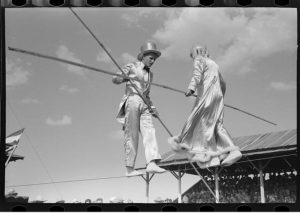 William F. Faulkner (1897-1962) won the Nobel Prize for Literature in 1949 and wrote 13 novels and a large collection of short stories. Aside from a few European trips and some brief stints in Hollywood, Faulkner accomplished all of these things on a farm in Oxford, Mississippi.
William F. Faulkner (1897-1962) won the Nobel Prize for Literature in 1949 and wrote 13 novels and a large collection of short stories. Aside from a few European trips and some brief stints in Hollywood, Faulkner accomplished all of these things on a farm in Oxford, Mississippi.
Faulkner refused to live in big cities with lively literary circles and preferred his pre-Civil War farmhouse in the middle of an artistic no-man’s land. Yet, Faulkner not only remained productive but he also continued to write groundbreaking fiction.
Faulkner did say, “A bus station is where a bus stops. A train station is where a train stops. On my desk, I have a work station…”. But he worked hard nonetheless.
In order for Faulkner to stay ahead of the curve and keep pen to paper he relied on the following productivity tips:
1. Stop Looking at the Clock: In his novel Sound and the Fury, Faulkner writes, “Clocks slay time… time is dead as long as it is being clicked off by little wheels; only when the clock stops does time come to life.” Staring at the clock doesn’t get your work done and it certainly doesn’t make time go by any faster. Worse, clock gazing kills creativity and imagination. If you stop looking at the clock and at your work you’ll do it faster and with more energy.
2. Be Stoic About Work: If you think about it, work is the only thing we can sustain for a long period of time. Faulkner said, “It’s a shame that the only thing a man can do for eight hours a day is work. He can’t eat for eight hours; he can’t drink for eight hours; he can’t make love for eight hours. The only thing a man can do for eight hours is work. ” In this light work seems less like an obstacle and more like a gift, a challenge to be accepted. If work is all we can do for 8 hours straight–why don’t we do a damned good job?
3. Practice, Practice, Practice. Faulker believed that reading everything, from cheap magazines to highbrow novels, helped his craft. He said, “Read, read, read. Read everything — trash, classics, good and bad, and see how they do it. Just like a carpenter who works as an apprentice and studies the master. Read!” This goes with any field. The more you know about your trade, the easier and faster and better you can work.
4. Don’t Stoop To Anyone’s Level: Hemingway once said of Faulkner, “Poor Faulkner. Does he really think big emotions come from big words?” Hemingway had a point. Faulkner’s prose is dense, complicated, and takes work to get through–but it’s also rewarding, rich, and large in scope. In reply, Faulkner said: “[Hemingway] has never been known to use a word that might send a reader to the dictionary.”
It’s a battle between literary styles, but it’s also one that informs Faulkner’s work habits. Faulkner never tried to find the lowest common denominator and the purest emotion. He wanted to keep things murky in order to keep the reader in suspense. He tried to challenge and test people and that made him work hard to search for new literary styles, interesting words, and literary references. You don’t have to work to make everyone happy, sometimes it’s better to work for yourself.
5. We’re Failures, So Fail Beautifully: If you think for a moment that you can achieve any amount of perfection in your work…you’re either delusional or an intern fresh out of college. Faulkner agrees: “All of us failed to match our dreams of perfection. So I rate us on the basis of our splendid failure to do the impossible.” We have to admit our inability, but we have to make sure we try our hardest get close to perfection.
6. Save Time, Kill Your Darlings: Faulkner famously said, “Kill your darlings.” This violent command was actually a sound piece of advice for writers. Faulkner believed that sentences beloved by their authors were most likely long winded, extraneous, and were only kept alive out of blind love rather than real need. This philosophy drives all of Faulkner’s work and pressed him to write not only what he thinks is good, but what is good by itself. Anyone who wants to work harder and better should bear in mind that jobs aren’t done because they meet a base standard–they are only done after you have done a lot of ruthless killing.
Most of Faulkner’s work habits and beliefs are cynical. He thinks that you can’t help but work, the beloved work you do should be killed, and the work that you turn in is no where near perfection. But behind his negativity, Faulkner believes that people can achieve great things. After all, he also said, “You cannot swim for new horizons until you have courage to lose sight of the shore. “



